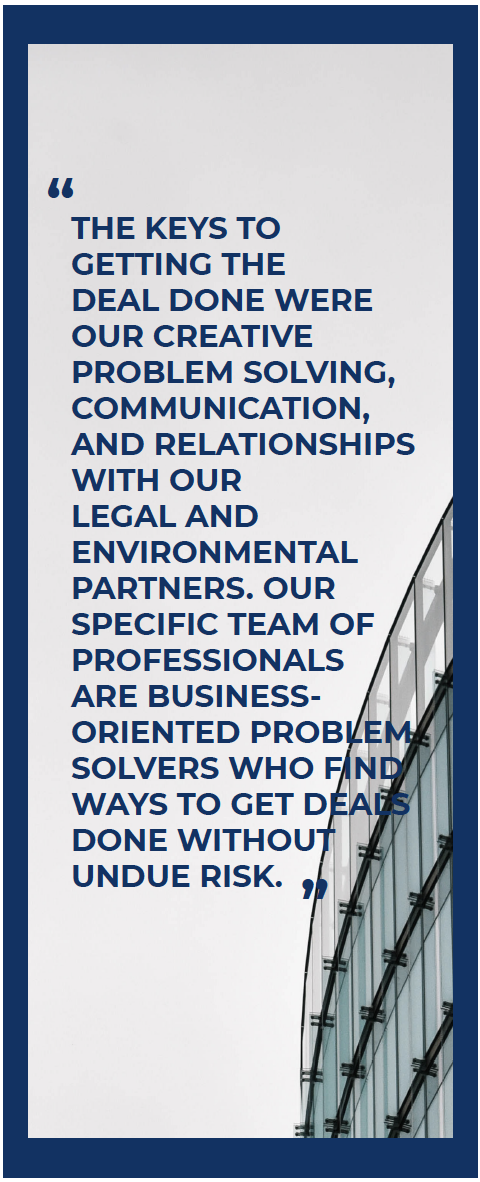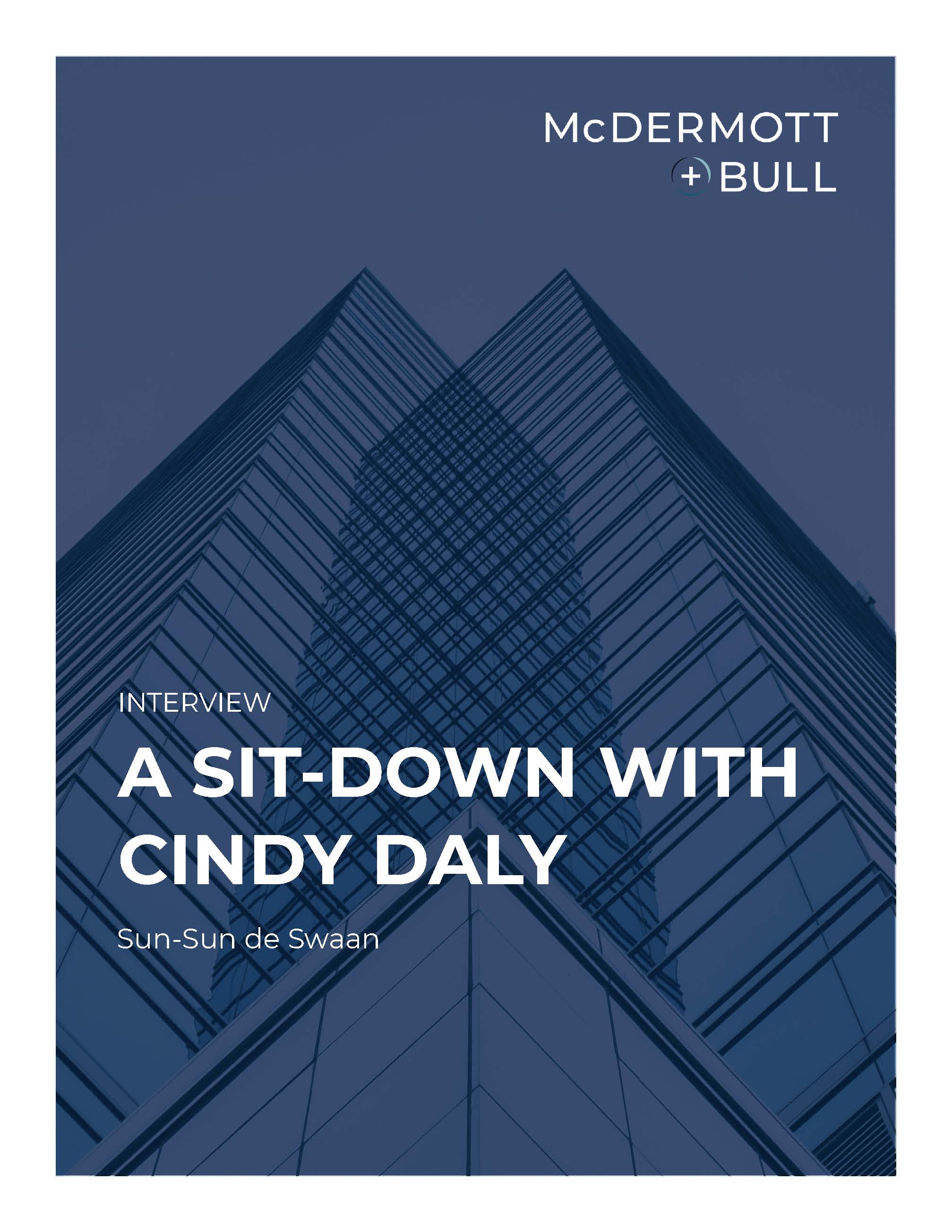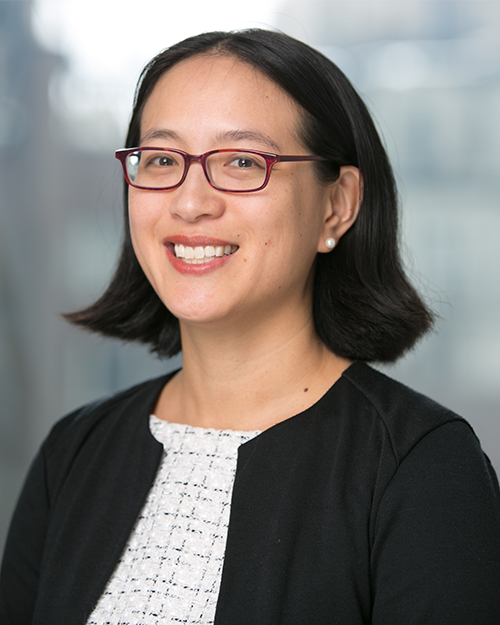I recently spent some time with Cindy Daly, Senior Vice President of Underwriting for the real estate investment trust (REIT) Four Springs Capital Trust. She has been in the REIT industry for over 20 years and has gained invaluable insights throughout her impressive career. I picked her brain on the way investing in industrial properties has changed, the most challenging deal she has closed, and the most valuable business lessons she has learned.
Sun-Sun: Thank you so much for joining me today, Cindy!
Cindy: It’s my pleasure!
Sun-Sun: Alright, let’s get into it. I’d like to start with your career. What was your most surprising or unexpected career transition?
Cindy: I used to work as a floating teller at a local bank, which is now part of PNC Bank. I did it to make extra money during high school and college, and I continued after I received my undergraduate degree while I was waiting for my acceptance into law school.
I happened to notice the bank had a management training program. On a whim, I asked myself, Why not? So, I applied. Despite having excellent recommendations from my senior managers, I was disqualified because I did not have enough college business credits, thanks to a newly enacted requirement within the training program.
I was three credits short! I could not believe it. I was heartbroken. Naturally, I would have taken the required credits had this rule been in place during my last semester of school — but what could I do? I couldn’t go back in time.
Sun-Sun: That sounds very frustrating. So, what did you do?
Cindy: Well, I really needed a plan B. If I didn’t get into law school, what was I going to do? The job market was extremely tight, so I figured this might be one of those times to throw caution to the wind. I figured I had nothing to lose.
I brushed off my best English major skills and wrote a letter to the President of the bank explaining my qualifications and why I would be an asset to the program and the bank, despite falling a few credits shy. I thought, The worst case is he doesn’t respond.
But the letter worked! Someone from human resources called asking which job I wanted. I was stunned. I had no idea what to say because I was so focused on getting into the management training program, I didn’t know what job to take. He told me that the credit department was a great starting place for most of the bank’s growth areas.
Sun-Sun: That is a very inspirational story, Cindy! You really took your career into your own hands. How did that decision lead you to your current role at Four Springs Capital Trust?
Cindy: Well, that was just my first unexpected transition. The next one came as I moved through the credit department. There was an opportunity to work on commercial real estate credit. Despite it sounding incredibly boring compared to what I was doing, it was a promotion, so I jumped at the chance to move up.
It didn’t take me long to figure out how exciting commercial real estate really is, because it touches all areas of business and the economy. Little did I know that decision would put me on the path toward my current position as Senior Vice President of Underwriting at Four Springs Capital Trust.

Sun-Sun: So, how did you get to FSC Trust?
Cindy: Honestly? I thought I’d stay in banking for the rest of my career. It was all I knew. However, when I had advanced to a commercial real estate relationship manager position with the bank, real estate investment trusts really began to pique my interest. Never one to be shy, I let my team leader know and he assigned me the few REITs in the bank’s portfolio.
During my time, I established a solid working relationship with a senior manager of one of my REIT clients, who was well into his late 80s and was thinking of retiring. He had this crazy idea that I would be a good “replacement” for him.
I took him up on his offer and was fortunate enough to work closely and learn from him until he was in his 90s. As a result of his crazy idea, I had successfully left banking behind and I’ve been in the REIT world ever since.
Sun-Sun: That’s incredible. So, he was like a mentor to you. It makes me wonder, throughout your career, what is the best piece of advice anyone has ever given you?
Cindy: There are two pieces of advice that have stuck with me over the years.
First, when I graduated college and was struggling with that difficult decision of whether to pursue law school or enroll in the management program at the bank, my mother said, “Remember, nothing’s permanent.” She was trying to tell me that no matter what path I chose, I could always choose another.
Sun-Sun: What’s the second piece of advice?
Cindy: The second comes from two books The Seven Habits of Highly Effective People and The One Thing, which really resonated with me. They have kept me mindful of my personal and professional priorities, both in the long and short term. I have them listed on a white board in my office, starting with my health and my relationships with family and friends.
They serve as a constant reminder of what’s most important. I use them to plan my days, with an eye on my top priorities when I ask myself daily, What do I most want to achieve today, and what do I have to do to accomplish that?
But when I think about what I want to achieve, I realize those are the big goals, not items on a to-do list. So, my to-do list is made up of the incremental steps I need to accomplish on a given day to achieve the big goals.
Sun-Sun: Can you explain?
Cindy: For example, if I want to run a marathon, I might need to run the five miles that my training program requires before I start my workday. I apply this thinking and planning to my short- and long-term career goals, and it has really worked for me. I’m able to manage my time to stay focused on my priorities.
That being said, most of the time unexpected events interrupt my carefully crafted daily plans. At the end of the day, I often find myself thinking, I did nothing that I needed to do today. However, that’s fine, because this method allows or, in fact, requires me to refocus on what I need to do, how to pick myself up, and start over every morning. It helps me try again tomorrow without going off track in the long run.
Sun-Sun: That’s great advice! Now that you seem to be in a role you love, what has been your most challenging deal and how did you overcome the challenge?
Cindy: FSC Trust recently purchased a large, renovated Amazon distribution facility located on an assembled site that had a complex environmental history going back 50 years, all of which had to be quantified, understood, and accepted by our own REIT as an investor in the property. That was a challenge unto itself.
On top of that, this deal was to be syndicated to investors. So, we had to also explain the problem, its resolution, and current status to our individual investors and due diligence officers in a clear, concise, and coherent way, while answering any questions that arose.

At first glance, the concerns this transaction raised seemed insurmountable, but our team loves a challenge, so we dug our heels in and began to work.
The keys to getting the deal done were our creative problem solving, communication, and relationships with our legal and environmental partners. Our specific team of professionals are business-oriented problem solvers who find ways to get deals done without undue risk.
This was our first time working with this seller and we had to build that relationship during the diligence process. Lucky for us, the seller was also very professional which was a huge help in overcoming the challenges. They kept impeccable environmental records from their own diligence and understood our need to work through those challenges. They worked collaboratively with us to resolve our concerns and questions.
The icing on the cake was the investors loving the deal and syndication selling out fast. We have established an ongoing relationship with the seller and continue to work with them on current and future deals.
Sun-Sun: You mentioned that was an industrial deal. How has the influx of interest in owning industrial assets impacted how you vet deals?
Cindy: The competition for industrial deals was fierce even before the pandemic, and it’s only gotten stronger. Our velocity of vetting deals has certainly increased as investor interest has grown, forcing us to bid on more deals to acquire more industrial properties. At the same time, we’ve been raising capital, so our acquisition goals have also increased quite a bit.
In addition to conventional bidding on properties, we have also been working hard to make our own deals in a couple of different ways.
First, we’ve been approaching our current industrial tenants with blend and extend opportunities, which benefit everyone. If we have a good relationship with a tenant and they like our property, we can provide the security of additional lease term and locked-in rent in the face of rising industrial rents. We can also contribute some tenant improvement dollars toward their space. Those improvements substantially increase the value of the property for us as cap rates have compressed.
Along the same line, we’ve been finding value in selectively purchasing properties with shorter lease terms and structuring a mutually agreeable lease extension with a tenant improvement contribution. Second, we’ve been directing our energies toward creating sale-leasebacks with middle market private credits and even larger public tenants. Everyone in our organization knows that if they drive past a piece of real estate they like, or discover an exciting new product, they should speak up. Our acquisitions team will research that property or tenant and approach them about doing a sale- leaseback on one or multiple locations.
If we’re able to generate a lease structure that’s favorable for both us and the tenant, the tenant will be able to redeploy the capital that was freed in the transaction to reinvest in their business, and we will have created an accretive addition to our portfolio.
All of these scenarios are made possible by the ability of our team to underwrite real estate and tenant credit to find the real opportunities and quantify and mitigate risks.
Sun-Sun: That’s some really interesting insight, Cindy. Given your experience in industrial lately, how would you compare industrial to office space as an investment vehicle in a post-pandemic world?
Cindy: Even before the pandemic, office investment had fallen out of favor compared to industrial properties. Part of the reason is that the tenant improvement allowance upon lease turnover in office buildings was extremely expensive relative to industrial.
The counterargument was that office tenants may be more likely to be “sticky” and stay in their space longer. It’s often disruptive and expensive to frequently relocate given where employees and clients live. Plain industrial distribution space generally doesn’t raise as many concerns around employee and client locations.
Tenants usually employ far fewer workers in similar square footage with a much lower tenant improvement cost, so it’s usually cheaper to move, assuming they could find space in a similarly suitable distribution location at a lower rent.

However, there are two factors that I think has turned this thinking on its head. First, companies are now realizing that many jobs that were formerly done in central office locations can easily be done just as well by remote employees.
There’s ongoing debate about the extent that companies will require office workers to return five days a week. That will vary, of course, with some working from home full time, some in hybrid arrangements, and others going back full time.
Companies and their management teams have become more confident in the effectiveness of remote workers, and more employees are pushing back against commuting five days a week. It seems certain that there will be a greater number of remote workers than there were before the pandemic. This, of course, points to an overall reduced need for office space.
On the other hand, the two things that have solidified industrial as a favorable investment vehicle were amplified during the pandemic. First, nearly everything we use in our daily lives has come through an industrial building at some point. They touch all corners of the global economy.
It doesn’t matter if we’ve ordered it online for home delivery, bought it in a store, or made it at home. All items, at some point, have travelled through one or more industrial buildings.
The second thing we’re seeing in industrial is tremendous tenant investment in technology and equipment in these buildings, including sophisticated robotics, which, in a large number of cases, well exceeds our investment in the properties. These investments make industrial tenants “sticky” in their properties to an extent we have never seen before.
Sun-Sun: That’s a great take on the market. This has been an interesting conversation and I hope my readers have learned something from your insights. Before we go, I was hoping you would share a fun fact about yourself, or something few people know about you.
Cindy: Oh, boy! Well, for quite a few years before the pandemic, my family and I were clowns in the Macy’s Thanksgiving Day Parade. We played a lot of roles over the years — sleepy clowns, santa’s elves, and firefighter clowns come immediately to mind. Though, my most epic role was the viking clown in charge of the confetti catapult.
I’m not sure how, but I’m pretty confident that this particular skill set will come in handy again someday.
About the Author
Sun-Sun de Swaan
Managing Director
sdeswaan@mbexec.com
Sun-Sun de Swaan serves as a Managing Director at McDermott + Bull in the New York office where she leads the firm’s real estate practice. Sun-Sun brings nearly 20 years of real estate experience and works with clients across the sector, including firms involved with investment, development, financing, and property management.
Sun-Sun has nearly a decade of experience leading real estate practices in executive search. Previously, she served as the Director of Acquisitions for Highgate, a leading real estate investment and management company. Prior to Highgate, she acquired principal-side investment and asset management experience during her tenures with Hersha Hospitality Trust and Denihan Hospitality Group. At the start of her career, she worked as a Senior Consultant providing transaction advisory services to lenders and investors at Ernst + Young’s Real Estate group and PKF Consulting.
Sun-Sun received her Bachelor of Science in business administration from University of California, Berkeley and her MBA from IESE Business School in Barcelona. In her free time, she enjoys traveling and cooking.



